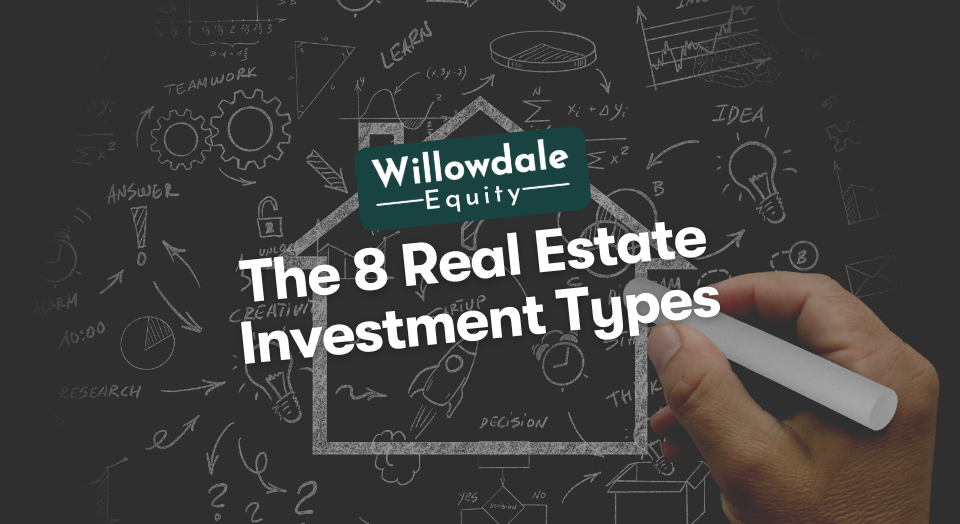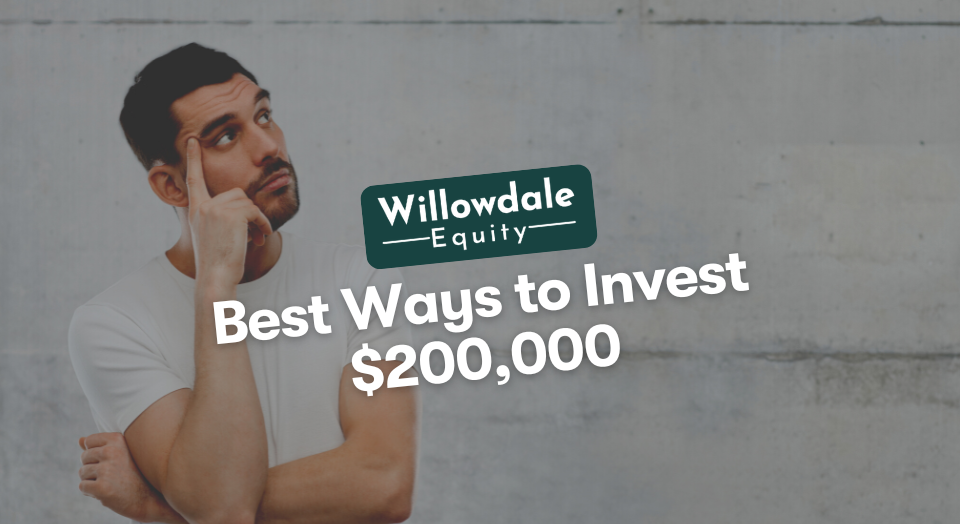
The 8 Real Estate Investment Types You NEED To Know
This article is part of our guide on how to invest 1 million dollars for income, available here.
While real estate is a topic that most people know at least something about, many different real estate investment types exist. This blog post will discuss the different types of real estate investors and how they invest in real estate. We’ll also explore the various options available to real estate investors and what you should look for when investing in a property.
Key Takeaways
-
Real estate investors have a wide variety of options when it comes to investing in property.
-
Some savvy investors will fix up a house to increase its value and then refinance all of their cash out of the deal. This will free up capital for the investor to buy more real estate investment properties. This is a long-term real estate investment strategy that can be very profitable if the real estate appreciates with time.
-
Residential properties are valued by other nearby homes which means that it is much more difficult to change the property value. Commercial properties are valued on a multiple of their annual net income.
-
Whether you are looking for your next primary residence, vacation home, or investment opportunity, there is something out there that will meet your needs and provide the desired return on investment.
Real Estate Investment Types:
There are tons of forms of real estate investment types that you need to be aware of. With that being said, here are the eight real estate types that yield a strong ROI for beginner and large-scale investors.
- Vacant Land Investor
- Industrial Real Estate Investments
- Single Family Real Estate Investing
- Fixing and Flipping Houses
- Buy and Hold Investment Strategy
- Duplexes and Triplex Investors
- Commercial Real Estate Investing
- Multifamily Real Estate Investing
Vacant Land Investor
A vacant land investor purchases parcels of undeveloped land with the intent of holding it until the right opportunity arises. Often, these investors are looking for a specific property or lot that meets their criteria, and when they find it, they will buy it and wait for the right time to develop it.
Vacant land investors can be very successful if they understand the real estate market well and can time their investments correctly. In some cases, vacant land investors partner with developers who help them develop the property in exchange for a share of the profits.
If you’re interested in becoming a vacant land investor, it’s essential to do your research and learn as much as you can about the market. It would help if you also understood the development process to time your investments correctly.
The primary investment strategy for a vacant or raw land investor is to buy low and sell high. This investment can go wrong really fast if the timing is wrong. It is also not as easy to get favorable financing for this property investment because, in most cases, it doesn’t produce any income.
Industrial Real Estate Investments

Industrial real estate investments are properties that are used for manufacturing, warehousing, or distribution. These properties can be very profitable if you know what to look for and how to negotiate the best deals.
One thing to remember when investing in industrial real estate is that these properties require a lot of maintenance and upkeep. If you’re not prepared to deal with the day-to-day operations of industrial property, then it may be wise to steer clear of this type of investment property.
Another thing to consider when investing in industrial real estate is the property’s location. You want to ensure that the area is economically viable and has a strong workforce. You also want to make sure that there is adequate infrastructure in place to support the property.
Investing in industrial real estate can be lucrative, but it’s essential to do your research and understand what you’re getting into. Make sure you have an excellent team to help you with the property’s day-to-day operations, and be prepared for some bumps in the road.
Single Family Real Estate Investing
Single-family real estate investing is one of the most popular real estate investments. This real estate investment involves fixing distressed single-family homes and reselling them to retail buyers. Many people refer to this as flipping.
Fixing and Flipping Houses
This form of real estate investment carries plenty of potential risks but can also be very profitable if done correctly. One of the most significant risks with flipping houses is that you can quickly lose money if you don’t know your post-renovation value. Many factors determine a home’s value, and if you sell for less or take too long to sell because your asking price is too high, you will be in trouble.
When flipping residential real estate, there are many things to consider, such as renovation costs, agents’ commissions, and carrying costs. If you miscalculate the costs involved, you’ll also lose money. Contractors are notorious for being disorganized, dishonest, slow, or may leave certain items out of their quote, leaving you with higher costs than anticipated.
Buy and Hold Investment Strategy
Some savvy investors will fix up a house to increase its value and refinance all of their cash out of the deal. This will free up capital for the investor to buy more real estate investment properties. This long-term real estate investment strategy can be very profitable if the real estate appreciates with time.
After refinancing the property, the investor will make sure to have a tenant in the property to pay the expenses of the property and some. This excess cash produced every month is called positive cash flow. This is not entirely passive income because the real estate investor still needs to manage the property unless they hire a property management company. Property managers can be great but usually don’t work well on a rental property that doesn’t produce much rental income.
Property managers should be compensated fairly, and since the property has only a single rentable unit, it’s impossible. This can work against you because if the property manager doesn’t get paid well, your property may not be prioritized the way you want it to be, which will cost you more.
Duplexes and Triplex Investors
Investing in duplexes and triplexes is a great way to start real estate investing. These real estate types are easy to buy and provide a good return on investment. You can usually find duplexes and triplexes in areas transitioning from a bad neighborhood to a good one.
The key to making money with this type of real estate investment is finding the right tenant. You want to ensure you’re getting quality tenants who will take care of the property and pay their rent on time. Since their property types have more than one rentable unit, they are safer and serve as better investments than single-family homes.
One of the most significant downsides of these kinds of real estate investments is that they aren’t very scalable. As a new investor buying 2 or 3 units per transaction is excellent, but after about 10 to 15 units, it’s not that exciting to add only 2-3 units at a time. You’ll want a greater return on your time and start buying larger assets with much more potential and less risk.
These real estate investments are significant problems because they don’t sell very quickly. These properties don’t make sense for anyone other than new investors, as most investors “outgrow” this real estate investing strategy. Your buyer pool is either new or small-ball investors that want to mitigate their risk a bit and buy more than 1 unit (single-family home). Some investors love them; some investors won’t touch them. They are not bad options, but there are some better real estate investment options.
Commercial Real Estate Investing

This real estate investment usually involves buying an office building, retail strip mall, or warehouse and then leasing it to businesses. A great benefit of commercial properties is the way that they are valued. Other nearby homes value residential properties, so it is much more difficult to change the property value. Commercial properties are valued on a multiple of their annual net income. This means that if you can find a way to cut an expense or generate more revenue through renovations or with a creative idea, you can increase the property’s value.
The best part about commercial real estate investments is that the leases are longer-term, typically three to five years. This gives you more stability as an investor because you don’t have to worry about vacancies as often as you would with residential real estate.
The main downside of this type of investment is that it takes a lot more money to get into than residential property. Most commercial real estate costs a few million dollars or more. Also, with the pandemic, this type of real estate was severely impacted because businesses were forced to shut their doors, making it difficult for commercial property owners to make payments.
Multifamily Real Estate Investing
This type of commercial real estate investing is the king of all real estate investments. This type of real estate involves multiple units (5 residential units or more) on a single property. This type is superior to all other real estate investments because it has numerous income streams, which significantly increases your chances of covering all expenses every month, even if some units are vacant or you have trouble collecting rent.
This investment type is a form of commercial real estate but refers to apartment buildings or any property that can accommodate multiple families on a single property. This is great because people will always need a place to live, regardless of what’s happening in the economy.
Size & Taxes in Multifamily
The bigger you go in multifamily, the better. A property with more units means more security (since there are more opportunities to collect rent) for the owner. Also, since these assets generate high income, property managers can be compensated well for taking care of the asset. This means that a savvy real estate investor can make passive income by leveraging the property manager’s time and focusing on finding more deals and more money to buy more commercial properties to invest in.
Another fantastic advantage of owning this type of real estate is your tremendous tax benefits. The government wants to incentivize multifamily real estate investing, so they offer many great tax benefits for those who invest in them.
The main downside of this investment type is the difficulty in getting started. To invest in most multifamily real estate, down payments of 1 million dollars or more are expected. Also, just having the money isn’t enough. To find good deals, you must build relationships with real estate brokers that have all the great deals. Most people can’t enter this type of real estate investing world unless they have lots of money and want to settle for a mediocre deal. There is a solution to both of these problems, and it’s called a Real Estate syndication.
Types of Property Investors
There are several types of property investors in real estate. Those real estate investors might focus on the following strategies:
- Fix & Flipper
- Land Investor
- Buy & Hold Rental Investor
- Mobile Home Park Investor
- Commercial Real Estate Investor
Each type of investor has their own investment goals, real estate investment risk exposure, return expectations, and timeline for holding those assets. Within those types of real estate investments, there are different types of groups that perform the above strategies, such as:
- Private Equity Firms
- Small/Medium/Large Institutions
- Banks
- Insurance Companies
- Endowment Funds
- Sovereign Wealth Funds
- And much more!
Real Estate Investing Examples: Multifamily Real Estate Syndications
A Real Estate Syndication is when a group of real estate investors pool their money together to invest in a more significant real estate deal. This is arranged by a General Partner (or GP) who is experienced and has relationships with property managers, contractors, and brokers.
The Limited Partners (or LPs) are 100% passive investors that invest in the deal. LPs have no liability in the deal other than their initial investment. Typically, a minimum investment is about 50k. This amount is much more realistic for the average investor to invest in than a million dollars or more if they buy on their own. Investing in syndication gives LPs all the benefits of investing in large multifamily assets without any work or needing any experience.
Frequently Asked Questions About Types of Property Investment
An example of a real estate investment is buying a property to rent out to tenants. Another example is buying a home to fix and sell for a profit. There are many types of real estate investments, each with its risks and rewards.
The most popular type of real estate is residential real estate. This is because people always need a place to live, and residential real estate offers many opportunities for investors to make money.
Real estate is a physical asset, like land or a building. Yes, real estate can be considered an investment. When you purchase real estate with the intent to rent it out or sell it for a profit, you are investing in real estate.
Real Estate Investment Types - Conclusion
Real estate investors have a wide variety of options when investing in property. Whether you are looking for your next primary residence, vacation home, or investment opportunity, something out there will meet your needs and provide the desired return on investment. When making an essential decision like this one, be sure to do your research to know what type of real estate investor you want to be. Check out our FREE 5-Day passive multifamily investing video mini-course to grow your knowledge base further today.
Interested In Learning More About PASSIVE Real Estate Investing In Multifamily Properties?
Get Access to the FREE 5 Day PASSIVE Real Estate Investing Crash Course.
In this video crash course, you’ll learn everything you need to know from A to Z
about passive investing in multifamily real estate.
We’ll cover topics like earned income vs passive income, the tax advantages, why multifamily, inflation, how syndications work, and much much more!




